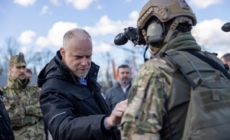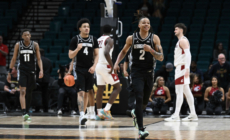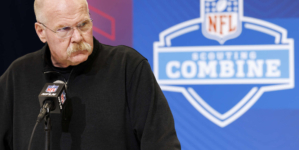-
De minimis trade loophole that boosted Chinese online retailers to end May 2 - 14 mins ago
-
2025 LIV Golf Miami: Predictions for FOX Super 6 by FOX Sports Research - 35 mins ago
-
Hungary and Serbia boost military cooperation - 39 mins ago
-
Chiefs Replace Joe Thuney, Help Out Chris Jones in Ideal NFL Draft Scenario - 44 mins ago
-
EC President von der Leyen - about 1 hour ago
-
Hungary-Slovakia gas interconnector capacity expanded - about 1 hour ago
-
Shohei Ohtani hits walk-off home run on his bobblehead night to keep Dodgers undefeated - about 1 hour ago
-
How to Watch Nebraska vs. Georgetown: Live Stream College Basketball Crown Tournament, TV Channel - about 1 hour ago
-
9-year-old dies after dental surgery. Cause is under investigation - 2 hours ago
-
7 Greatest Spears in WWE History - 2 hours ago
One of First Female Pilots in U.S. on ‘illegal’ way she flew planes in 70s
Stephanie Wallach, a trailblazer in the male-dominated world of commercial aviation, forged an extraordinary career as one of the first female airline pilots in America, overcoming significant challenges and reshaping the aviation landscape for women.
In an interview on the Out of Office podcast in November 2024, Wallach, who hails from New Rochelle, New York, spoke about her fascinating career spanning from 1975 to 2006, including the “illegal” way she used to fly in the 1970s before she became a captain.
Globally, the percentage of female airline pilots is estimated to be between four and six percent, “but it is growing,” the Centre for Aviation (CAPA) reported in July 2023.
The number of female airline pilots in the United States was reported to have grown by 71 percent from 2002 to 2022, compared with a 15 percent increase for all pilots, while the proportion of female airline pilots in the U.S. rose from 3.3 percent in 2002 to 4.9 percent in 2022, according to CAPA.
Wallach’s story offers a unique perspective on the evolution of the aviation industry.
Ryan Davis, one of the co-hosts of the podcast, told Newsweek: “I had long known Stephanie’s story through my longtime friendship with her son, Tommy. Whenever she was around, she’d tell us tales of jet-setting around the world and her experiences as one of the early female pilots.
“I always found her stories fascinating and fun. I knew I had to have her on the podcast to share her journey—how far the industry has come, and to give our younger listeners a unique perspective on what it was like to be a trailblazing professional and a pilot during those formative years.”
iStock / Getty Images Plus
Breaking Into the Industry
The seeds of Wallach’s dream of becoming a pilot was planted by her mother’s musings at the dinner table.
“My mother would actually sort of threaten to go get a pilot’s license, and we would all laugh,” Wallach recalled on the podcast.
“She never did it,” Wallach noted, “but it was something that she always used to dream about and maybe that got tucked away somewhere in my brain.”
After college, Wallach moved to New York City and took her first flying lesson at Westchester County Airport in White Plains, New York, during the 1970s. Reflecting on her introductory flight, she described it as “one of those magical moments” that changed her life. Within half an hour of flying, “a spell was cast,” she said. “I just knew that was what I wanted to do forever.”
Opportunities for female pilots were scarce at the time, with flight instruction being one of the few available roles. Wallach briefly worked as an instructor before hearing of the groundbreaking hiring of Emily Warner as a pilot by Frontier Airlines in 1973.
Inspired, Wallach pursued her own path into the aviation industry, obtaining a flight engineer rating, a requirement to join an airline crew in the 1970s.
“Every airplane had three pilots, and the third pilot was a flight engineer,” Wallach explained in the podcast.
She applied to airlines across the country, eventually being hired by Braniff Airways in December 1975. At the time, she was one of only 10 female airline pilots in the U.S., Wallach said.
Climbing the Ranks
She began her career as a flight engineer, managing the plane’s hydraulics, pressurization and electrical systems. Though this role didn’t involve flying an aircraft, she made the most of the opportunity.
“I would watch, I would grab their approach plates, I would follow on the maps,” she said, explaining how she learned from experienced pilots. In a practice she admitted was “horribly illegal,” co-pilots sometimes allowed her to take the controls.
“Every once in a while…the co-pilot and I would change seats and they’d let me fly,” she said and “by the time I checked out as co-pilot, I’d probably flown 10 or 20 legs already.”
Within two years Wallach had moved to the co-pilot’s seat. She left Braniff to join Alaska Airlines and after only six years Wallach was a captain—a feat she credited to the airline’s expansion and her own persistence. She went on to become the first female Alaska Airlines pilot to reach the Federal Aviation Administration (FAA)-mandated retirement age, The Seattle Times reported back in February 2006.
Challenges as a Female Pilot
According to a July 2020 study in the Journal of Air Transport Management, “female commercial airline pilots have been experiencing gender prejudice and discrimination in the workplace.” The study found that “these prejudices and discriminations place considerable psychological burden on them which can significantly affect their behaviour and performance.”
Wallach faced resistance in her groundbreaking role as a female captain. Although most passengers were “pleasantly surprised,” there was some negativity from within the pilot ranks. Rumors circulated among her colleagues, with friends alerting her to them.
In the aforementioned Seattle Times article, Wallach recalled being told about a rumor “that I had been crying during an approach in bad weather,” which “wasn’t true.”
Wallach recalled a different rumor that another Braniff female pilot had “turned the wrong fuel valve and dumped fuel at the gate. She hadn’t.”
“I sometimes confronted the pilots who they said [the rumors] came from,” Wallach said in the podcast, acknowledging the toll of the “underground” hostility.
Asserting her authority often meant clashing with male co-pilots. Wallach recounted incidents where co-pilots refused to follow standard cockpit procedures, including one who ignored her preflight checklist request.
“He just could not take an order from me, so he wasn’t going to do anything I said,” she recalled.
Maintenance workers would also bypass her, directing updates to male co-pilots despite her being the captain.
“I would have to say, ‘Excuse me, please talk to me about this. I’m the captain,'” she said.
Such interactions reinforced the need for constant vigilance and self-advocacy.
“You’d have to fight for your authority…more than the men did,” Wallach said.
Her experiences highlight the persistence required to navigate the barriers she faced as a female pilot in a male-dominated field.
“When you assert your authority, then you sometimes can get a reputation for being difficult,” she explained, acknowledging the delicate balance required to lead effectively while managing biases.
Wallach’s career not only paved the way for future generations of female pilots but also serves as a testament to determination, skill and the willingness to challenge norms in pursuit of a dream.
Do you have a travel-related story to share? Let us know via life@newsweek.com and your story could be featured on Newsweek.
Source link






























